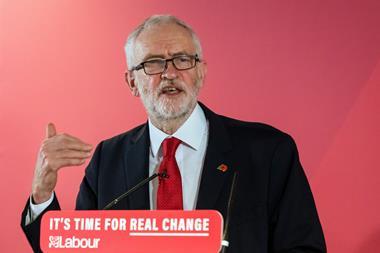Prime Minister Boris Johnson has announced a series of measures to help small businesses, including reforming business rates and increasing the Employment Allowance, if re-elected on December 12.

On Friday he announced businesses with a rateable value of less than £51,000 will receive an increase in the retail discount from 33% to 50% in 2020/21.
The Conservative Party estimates that this would be an effective £280m tax cut across the whole of the small business sector.
Figures from the Association of Convenience Stores (ACS) 2019 Local Shop Report show that the convenience sector currently pays around £308m in business rates. An increase in the discount for convenience stores with rateable value of under £51,000 could save the convenience sector over £30m next year, the ACS said.
The government claimed the average c-store would get a £1,400 cut in their business rates from the extension in the retail discount.
Speaking at the CBI Conference on Monday, the Prime Minister also announced that the Conservatives would commit to a fundamental review of business rates, and increase the Employment Allowance from £3,000 to £4,000, saying that this would amount to a tax cut of up to £1,000 for more than half a million businesses.
He also said a Conservative government would postpone its proposed cuts in corporation tax in order to save “£6bn” for public services. Corporation tax was due to fall from 19% to 17% next year.
Industry reaction
Welcoming the government’s rates commitment, ACS chief executive James Lowman said: “The problem we’ve had hasn’t been the lack of promises to review the business rates system, it’s that these have not been delivered and the overall burden keeps rising. We welcome this announcement, but businesses with rising rates bills, especially petrol forecourt stores who are treated very unfairly by the current system, want to see action.”
On increasing the rates discount, he said: “Local shops, especially those trading on high streets and in urban areas, will welcome these commitments to provide more help with the burden of business rates, but they also want national policies including help to cope with rising employment costs, a business rates system that promotes investment, and support for providing essential services in their communities.”
The British Retail Consortium (BRC) chief executive Helen Dickinson said: “We welcome the commitment to review our broken business rates system, which holds back investment and accelerates job losses and store closures across the country. This has been a longstanding call from the BRC and our members, and it remains essential to ensure retail can thrive in the future. However, in the shorter term, additional fixes are necessary.
”The offer to cut business rates for SMEs is welcome, but will not slow the decline in high streets that has seen many household names disappear in recent years. The Conservatives should commit to supporting investment and growth in retailers large and small, particularly as the majority of the UK’s three million retail workers are employed in businesses that will not benefit from the Conservatives’ proposed rates cuts.”
Labour leader Jaremy Corbyn announced at the CBI Conference that a Labour government would raise corporation tax to “no higher than 2010 levels [28%]” over the course of parliament.
He also said Labour would give more flexibility to the use of Apprenticeship Level funds.
Responding to the announcement, BRC director of business & regulation Tom Ironside said: “We are encouraged by Labour’s focus on making the Apprenticeship Levy system fit for purpose. The retail industry must be able to train their workforce so that employees’ skills remain relevant for the jobs of the future. The ambition to allow greater flexibility in what Levy funds can be spent on is welcomed, and we urge them to include all manner of training schemes to enable retailers to respond to the rapidly changing business environment.”
“However, we would urge caution around Labour’s plans to divert 25 per cent of Levy funds to apprenticeships in construction and manufacturing. Any additional apprenticeships should not be funded from retailers’ funding pots, reducing the monies available to reskill the retail workforce during the industry’s transformation.”
The Liberal Democrats have pledged to scrap business rates.




























No comments yet